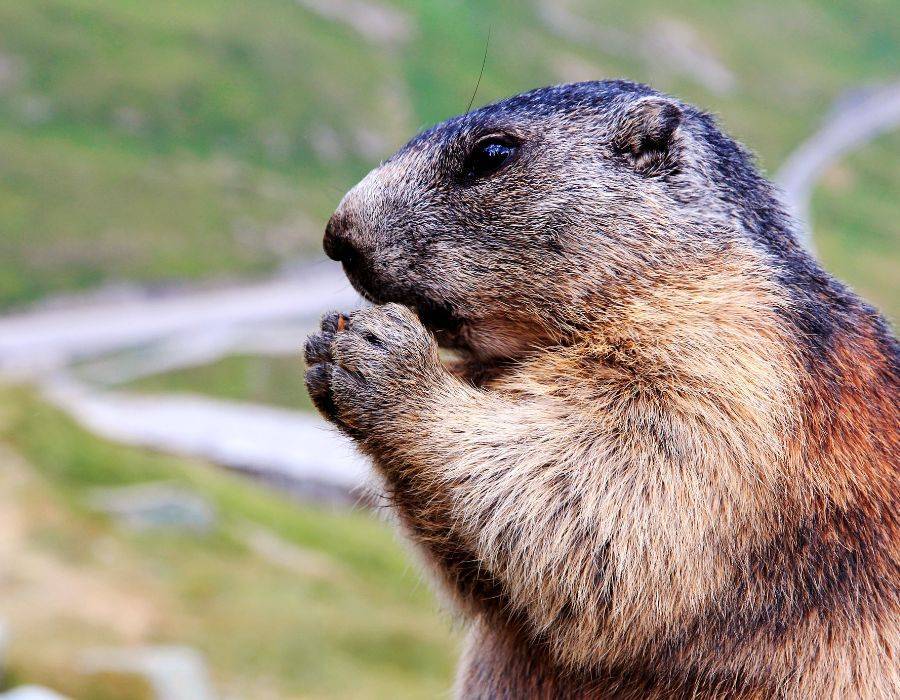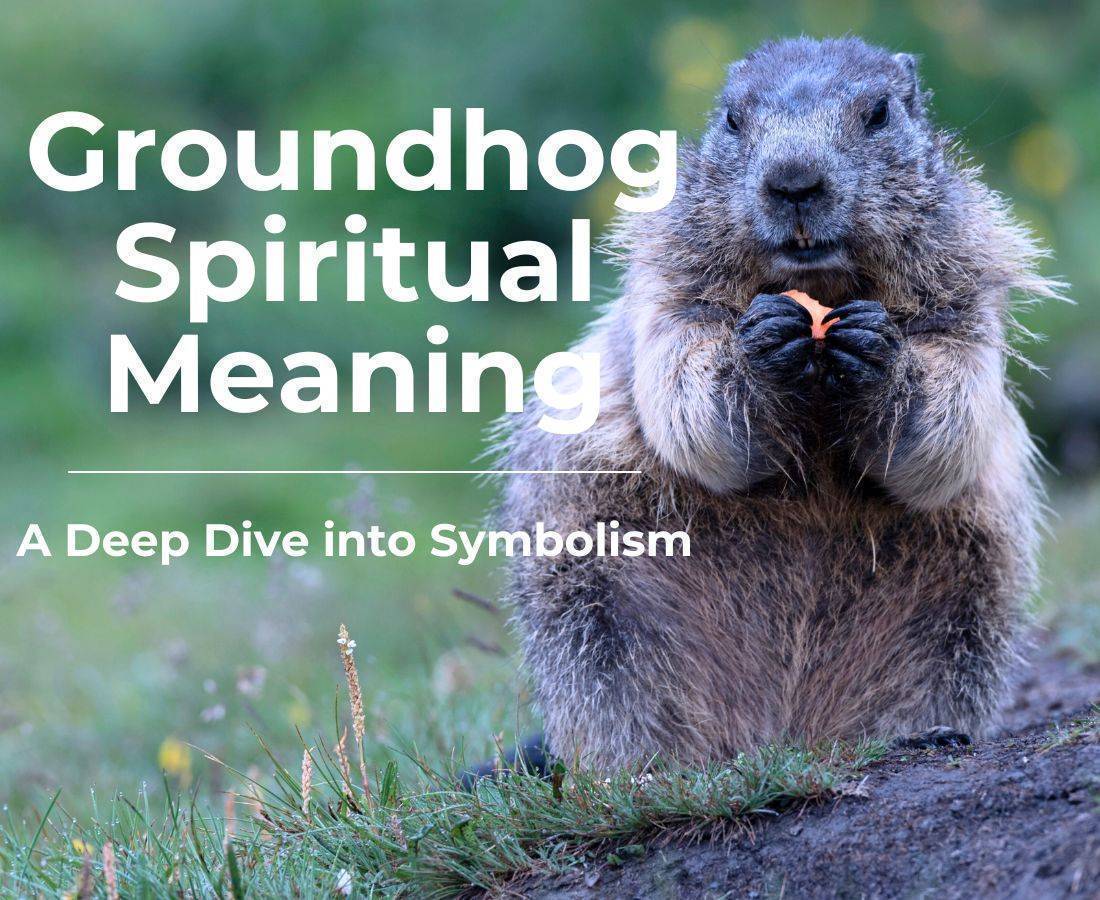The groundhog’s spiritual meaning is more profound than one might initially think. Have you ever watched a groundhog emerge from its burrow and wondered if there’s more to its actions than just predicting the weather? Groundhogs, with their deep connection to the earth’s rhythms, symbolize rebirth, renewal, and introspection.
Table of Contents
In this article, we’ll delve into the spiritual significance of these intriguing creatures across various cultures. Discover why groundhogs have been revered and what lessons they offer for our spiritual journeys. Stay with us to unearth the deeper truths behind this seemingly ordinary animal.
Key Takeaways
- Groundhogs symbolize protection, independence, and a connection to the earth element.
- They teach us the importance of solitude, self-defense, and awareness.
- Groundhogs are associated with rebirth, renewal, and personal growth.

Groundhog Symbolism & Meaning
Groundhogs, part of the large Ground Squirrels species or Marmot family, have various nicknames such as “Whistle Pig,” “Thickwood Badger,” “Moonack,” and “Red Monk.” The Algonquin word for “Woodchuck” translates as “digger,” laying the foundation for Groundhog symbolism.
Connection to Earth and Nature
Groundhogs are known for their burrowing habits. Digging deep into the earth symbolizes a profound connection with nature, grounding, and establishing a sacred space. Their burrows protect against predators, provide a place for hibernation, and nurture their young.
Awareness and Defense
Outside their burrows, groundhogs remain alert, often standing on their hind feet to observe their surroundings. This behavior symbolizes elevated perspectives and heightened awareness. Their sharp claws and teeth, ready to defend against intruders, represent survival and the art of self-defense.
Productivity and Determination
Groundhogs have incisors that grow rapidly but wear down due to continuous use. This characteristic symbolizes productivity, efficiency, determination, and the act of passionately diving into tasks.
Rebirth and Renewal
Groundhogs hibernate during the colder months, emerging in spring. This cycle of retreat and emergence symbolizes rebirth, renewal, and the cyclical nature of life.
Solitude and Independence
Groundhogs often prefer solitude. While they might share a burrow, they ensure multiple exits for personal space. This behavior teaches us the importance of boundaries, self-reliance, and the value of spending time alone for personal growth.
Groundhog’s Spiritual Significance Across Cultures
- Native American: In Native American stories, the groundhog is rarely mentioned. However, a tale from the New England Area speaks of a Woodchuck who adopts a culture hero, becoming a wise and patient teacher. This portrays the groundhog as a symbol of wisdom and guidance.
- Celtic: In Celtic tradition, February 2nd, known as Brigid’s Day or Imbolc, is a day of divination. The Groundhog’s Day tradition, where the creature’s shadow predicts the arrival of spring, draws from these ancient customs, adding weather prediction to the Groundhog’s symbolic repertoire.
- African: Groundhogs symbolize good luck, strength, and power in many African cultures. Seeing a groundhog is considered an omen of good fortune and resilience.
- Modern Western: The groundhog, especially through the popular tradition of Groundhog Day in North America, symbolizes prediction, seasons, and the cyclical nature of life. The event of Groundhog Day has become a cultural phenomenon, with Punxsutawney Phil being a central figure. Groundhog Day Traditions
Groundhog Glimpses: 10 Fascinating Facts & Their Spiritual Significance
| Groundhog Fact | Spiritual Meaning |
|---|---|
| 1. Groundhogs hibernate for up to 6 months. | Rest and Renewal: Emphasize the importance of taking breaks and rejuvenating oneself. |
| 2. They are also known as “woodchucks”. | Identity and Versatility: The ability to adapt and be known in various ways. |
| 3. Groundhogs can climb trees and swim. | Adaptability: Encourages versatility and finding various ways to tackle challenges. |
| 4. They use loud whistles to warn others of danger. | Communication and Community: The importance of alerting and protecting the community. |
| 5. Groundhogs have sharp incisors that grow continuously. | Growth and Persistence: Constant self-improvement and determination. |
| 6. They dig burrows that can be up to 30 feet long. | Depth and Exploration: Digging deep within oneself to discover hidden truths. |
| 7. Groundhogs eat a lot before hibernation to store fat. | Preparation: The significance of preparing for future challenges. |
| 8. They have a keen sense of hearing and strong eyesight. | Awareness: Being in tune with one’s surroundings and staying vigilant. |
| 9. Groundhogs can lose up to half their body weight during hibernation. | Transformation: The process of shedding the old to make way for the new. |
| 10. They are solitary animals and often prefer to be alone. | Solitude and Introspection: Valuing alone time for self-reflection and growth. |
Groundhog Dreams and Their Meanings
Dreaming of a groundhog can offer insights into your current life situation:
- Dark Burrow: Fear of facing problems.
- Peeking Groundhog: A warning of a potential threat or temptation.
- Digging Groundhog: A call for determination and facing challenges head-on.
- Hibernating Groundhog: A reminder to rest, rejuvenate, and seek clarity.
Groundhog’s Role in Modern Culture
Groundhogs have found their way into modern culture, primarily through the popular tradition of Groundhog Day. This event, celebrated every February 2nd, has its roots in ancient customs but has been embraced widely, especially in North America.

Groundhog Day: A Blend of Tradition and Pop Culture
Groundhog Day, as celebrated today, is a mix of ancient Celtic and German traditions. The Celts observed Imbolc, marking the midpoint between the winter solstice and the spring equinox. It was a time to predict the weather and determine how long winter would last. Similarly, Germans used a hedgehog to predict the coming of spring. When German immigrants settled in Pennsylvania, they brought this tradition with them but switched to using the groundhog, a native animal.
The town of Punxsutawney, Pennsylvania, is the most famous Groundhog Day celebration site, where thousands gather to see Punxsutawney Phil, the “prophetic” groundhog. If Phil sees his shadow, it predicts six more weeks of winter; if not, an early spring is on the horizon.
Groundhog’s Spiritual Connection to Seasons
Groundhogs, with their hibernation cycle, are deeply connected to the Earth’s rhythms. Their emergence from hibernation is not just a sign of spring but symbolizes rebirth, renewal, and new beginnings. This cyclical nature of life, death, and rebirth is a common theme in many spiritual traditions.
Lessons from the Groundhog
Beyond the fun and folklore, groundhogs offer several spiritual lessons:
- Awareness: Just as groundhogs are always alert to their surroundings, we too should be aware of our environment and the changes around us.
- Preparation: Groundhogs prepare for hibernation by gathering food and creating a cozy burrow. This teaches us the importance of planning and preparing for future challenges.
- Rest and Renewal: Groundhogs hibernate to conserve energy during the cold months. Similarly, we need to recognize when to rest and rejuvenate our minds and bodies.
Frequently Asked Questions
1. Are groundhogs and woodchucks the same?
Yes, the terms “groundhog” and “woodchuck” refer to the same animal. The name “woodchuck” is derived from the Algonquin name “wuchak,” which means “digger.”
2. Why is the groundhog a symbol of Groundhog Day?
The groundhog’s behavior of emerging from its burrow to predict the weather is an ancient tradition. Its hibernation cycle aligns with the midpoint between the winter solstice and spring equinox, making it a fitting symbol for predicting the arrival of spring.
3. What does it mean if you see a groundhog in your dream?
Seeing a groundhog in your dream can have various interpretations. It might symbolize a need for introspection, a warning of potential challenges, or a sign of new beginnings and growth.



